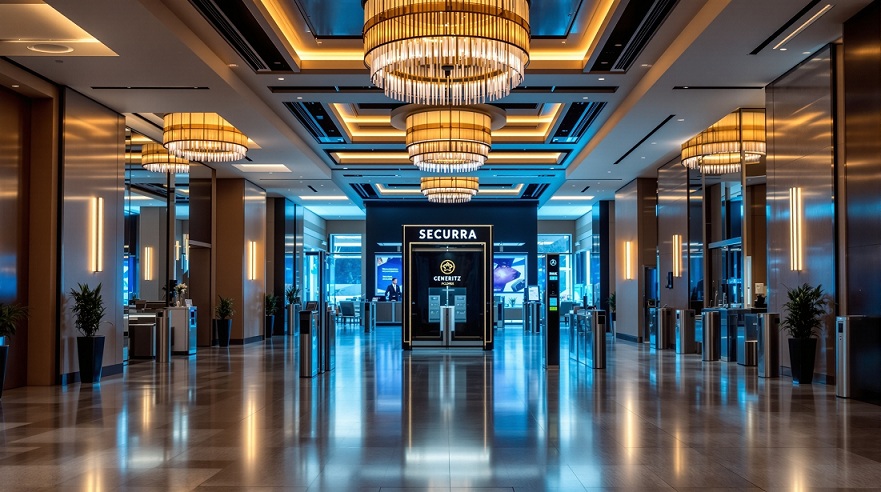Planning a successful event requires attention to countless details, but one aspect that often gets overlooked until it’s too late is venue security. Whether you’re organizing a corporate conference, wedding reception, private party, or community gathering, proper access control and security measures can make or break your event.
Why Venue Security Matters
Security isn’t just about preventing theft or unauthorized entry. It’s about creating an environment where guests feel safe, staff can work efficiently, and you can focus on delivering a great experience rather than dealing with preventable problems.
Event planners regularly face security issues like unauthorized guests entering restricted areas, lost or stolen keys during setup and breakdown, doors that won’t lock properly at critical moments, lack of control over who has access to what areas, equipment or supplies going missing, and difficulty securing the venue before and after events.
Pre-Event Security Planning
Proper security starts weeks before your event, not the day of. Walk through your venue and identify all entry and exit points, areas requiring restricted access such as kitchens, storage rooms, AV booths, and green rooms, locations of valuable items or equipment, potential security vulnerabilities, and existing lock and key systems.
Establish Clear Access Levels
Not everyone needs access to every area. Create clear access tiers that define who can go where. General access includes the main event space, restrooms, and designated public areas. Staff access covers kitchen and service areas, storage rooms, and staff break areas. Restricted access applies to cash handling areas, AV and technical equipment zones, high-value storage, and private offices.
Key Management Systems
Poor key management is one of the biggest security failures in event planning. Before the event, document all existing keys and who has them. Consider rekeying if the venue has had multiple recent events. Create a key checkout system for staff and vendors that requires signatures. Use color-coded or labeled keys for different access levels. Have a backup plan if keys are lost.
During the event, assign one person to manage key distribution exclusively. Require signatures when keys are checked out and set specific return times. Keep master keys secure and limit who can access them. Many event planners maintain relationships with reliable services like Locksmith For NYC to handle last-minute lock issues, rekeying needs, or emergency access situations. Having a trusted professional on speed dial can save your event when security problems arise.
After the event, account for all keys before dismissing staff. Inspect locks for damage or tampering. Consider rekeying if any keys remain unaccounted for. Document any security incidents for future planning.
Temporary Access Solutions
For multi-day events or venues with complex access needs, consider temporary access control options.
Smart lock systems offer several advantages for event planners. They provide programmable access codes that can be changed between events, time-limited access that automatically expires, audit trails showing who entered where and when, remote locking and unlocking capabilities, and no physical keys to lose or manage.
For larger venues, a master key system allows event staff to have limited access via individual keys, event managers to have broader access via sub-master keys, and venue owners to maintain ultimate control with grand master keys.
Day-of-Event Security Protocols
Even with good planning, you need clear procedures for event day execution.
During load-in and setup, designate specific entry points for vendors and staff. Require identification or credentials from all workers. Lock storage areas containing valuable items immediately after stocking. Restrict access to technical areas during equipment setup. Keep emergency exits accessible but monitored.
During the event itself, position staff at key access points. Keep restricted areas locked when not in active use. Monitor valuable items and equipment throughout the event. Have a clear plan for dealing with uninvited guests. Ensure emergency exits remain functional and accessible.
Breakdown security often falls apart when everyone is tired. Keep restricted areas locked until you’re ready to break them down. Don’t allow early departures by key holders. Maintain access control protocols until the venue is completely secured. Do a final walk-through checking all locks before leaving.
Emergency Access Planning
Things go wrong. Being prepared for security emergencies separates good event planners from great ones.
Create a comprehensive lockout response plan by following these steps:
- Identify potential scenarios – A key breaks off in a lock, the person with the master key leaves unexpectedly, a lock fails during the event, or you need emergency access to a locked area
- Establish emergency contacts – Save contact information for 24/7 emergency locksmith services in your phone and event documentation
- Secure backup keys – Store them in a secure but known location that multiple authorized people can access
- Define authority structure – Clarify who can make security decisions and authorize emergency measures
- Create communication protocols – Establish how security incidents will be reported and to whom
- Document response procedures – Write down step-by-step actions for common security emergencies
- Share the plan – Ensure all key staff members know the plan and their roles in it
Having this plan documented before the event means you can respond quickly rather than panicking under pressure.
Vendor and Staff Vetting
Security includes knowing who has access to your venue. Verify credentials of security staff and vendors before granting access. Check references for workers accessing secured areas. Create visitor badges for guests with backstage access to easily identify who belongs in restricted areas. Maintain a sign-in/sign-out log for all non-guest entries, which creates accountability and provides a record if issues arise.
Post-Event Security Review
After every event, conduct a security debrief. What worked well? What security issues arose? How were they handled? What could be improved for next time? Were there any close calls that need addressing? Document these learnings to continually improve your security protocols.
Budget-Friendly Security Improvements
You don’t need unlimited resources to improve venue security.
Low-cost measures include:
- Implementing a key checkout system using a simple spreadsheet or logbook
- Creating clear access level documentation shared with all staff
- Training staff on security protocols during pre-event briefings
- Using colored wristbands to designate different access levels
Medium-cost improvements include:
- Rekeying locks between major events or after security incidents
- Adding deadbolts to vulnerable doors
- Installing chain locks on storage areas
- Creating a master key system for venues you use regularly
Higher investments include upgrading to high-security locks on areas storing valuable equipment, installing smart lock systems, adding access control technology for larger venues, and implementing surveillance in critical areas.
Working with Venue Management
If you’re using a rented venue, coordinate security with management. Understand their existing security systems and policies. Clarify who is responsible for which security aspects. Get copies of all keys you’ll need well in advance. Discuss contingency plans for security issues. Ensure you have emergency contacts for facility issues.
Legal and Insurance Considerations
Security isn’t just about prevention—it’s about liability. Understand your responsibility for venue security as outlined in your contract. Verify your insurance covers security-related incidents including theft, property damage, and liability. Document all security measures taken in writing. Keep records of key distribution and access control. Know local regulations regarding event security, which may mandate specific measures for events over certain sizes.
Final Checklist: 24 Hours Before Event
Your final security verification should confirm all keys are accounted for and labeled clearly, access levels are clearly defined and communicated to all staff, emergency locksmith contact is saved in multiple locations, all restricted area locks are tested and functional, master key is secured with designated person, backup keys are accessible but secure, staff are briefed on security protocols, emergency access procedures are documented and distributed, and venue management is contacted to confirm security coordination.
Final Thoughts
Venue security might not be the most exciting part of event planning, but it’s one of the most critical. A single security failure can compromise your entire event, damage your professional reputation, and create serious liability issues.
The good news is that with proper planning, clear protocols, and reliable professional support when needed, most security problems are entirely preventable.

